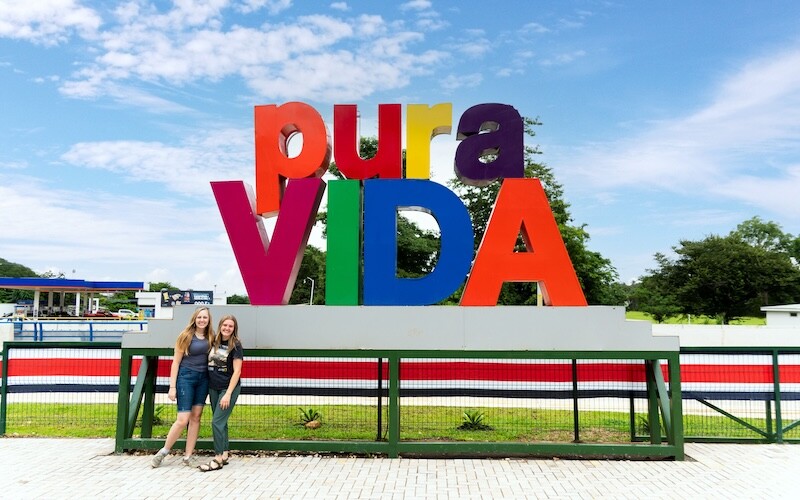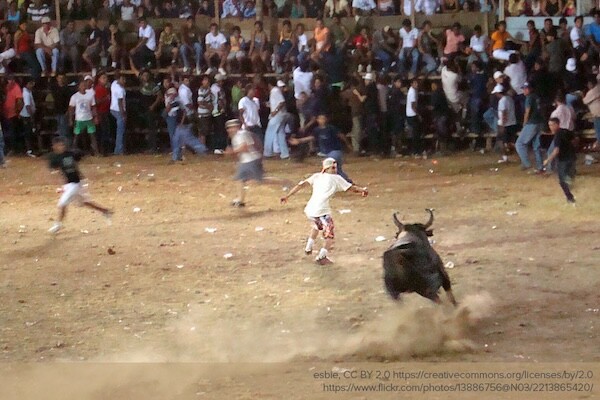Costa Ricans, or “ticos,” as they prefer to be known, are some of the happiest, friendliest people in the world. Costa Rica culture is a colorful tapestry of indigenous traditions and settler influence, woven together to make a beautifully diverse society.
“Pura vida” is Costa Rica’s unofficial national slogan, and you hear it everywhere. The phrase means “pure life” and is almost a cultural norm of the country. It describes the simple, cheerful outlook and lifestyle of Costa Ricans.
What Is Costa Rica Known For?

Of all the facts Costa Rica is known for, one stands out: Costa Rica is famous for its natural beauty. It is home to incredible beaches, rainforests, volcanoes, and over 500,000 different species of wild animals—about 5 percent of all species on earth! Because of Costa Rica’s biodiversity, it is a world leader in both ecotourism and conservation efforts. Costa Ricans prioritize nature, sustainability, and carbon-neutrality.
Costa Rica is also known for being a peaceful country with incredibly friendly people. Costa Ricans are welcoming and easygoing. They typically dislike conflict and avoid it when possible. The country is generally known for its political stability and relative prosperity.
When you travel in any foreign country, it is a good idea to check before you leave for any government alerts regarding safety.
What Language Is Spoken in Costa Rica?
The official language of Costa Rica is Spanish, but indigenous languages such as Cabécar, Bribri, Malecu, Guaymí, and Buglere are spoken as well. A large percentage of Costa Ricans speak a second language, and many people speak English—especially those who work in the tourism industry.
Costa Rican Spanish is known for being one of the easiest dialects for learners to understand, as Costa Ricans tend to speak slowly and without a strong accent.
Costa Rican Culture and Values

The Costa Rican saying “pura vida” encapsulates Costa Rica culture. Pura vida is about living a stress-free, simple life. It is about finding joy, being at one with the world around you, not sweating the small things, and being grateful for what you have. It is used to say “hello,” “goodbye,” “okay,” “I’m great,” and even “thank you.” It’s a very useful phrase!
The national animal of Costa Rica, the sloth, reflects this laid-back attitude and connection with nature.
Blending Indigenous and Imported Traditions
Cultural influences in Costa Rica stem from two major sources: the original indigenous peoples—such as the Bribri, Maleku, and Chorotega—and the Spanish, who made their first permanent settlement there in 1564.
Costa Rica gained independence from Spain in 1821, and its leaders have emphasized peace, education, and democracy. Today, Costa Ricans embrace both their indigenous and their colonial past, as well as influences from Asian and African migrants.
Family: A Cornerstone of Costa Rica Culture
Costa Ricans cherish their families, with mothers being particularly valued. In fact, Mother’s Day is a public holiday in Costa Rica. Families tend to maintain close bonds with one another.
Unique Costa Rica Traditions
Costa Rica culture includes distinct holidays, practices, and traditions—just like any country! Here are a few popular traditions to know.
Posadas
Many Costa Ricans are devout Catholics. As a result, many Christian holidays are less commercialized and more sacred affairs, especially in smaller towns. La Posada is a common way to celebrate Christmas. It is a 9-night community celebration that reenacts the journey of Mary and Joseph to Bethlehem. Each night, families visit a home in their community and recite the Rosary, ask for lodging, and sing carols to commemorate the Christmas season.

Bullfighting
Unsurprisingly, Costa Rican bullfighting has origins in Spain. Unlike traditional bullfighting, however, Costa Rican bullfighting does not result in killing the bull. The event is more about agility and skill in dodging, rather than fighting, the bull. Although the name is misleading, since no actual fight is involved, it is popular throughout Costa Rica. The largest arena is in the capital city of San Jose.
Folkloric Dance
A unique aspect of Costa Rica culture is the folklore that is told and remembered through dancing—in music, rhythm, and choreography. Some of these story dances include the Danza de los Diablitos, a dance originating with the indigenous Boruca tribe that tells the story of Spain’s invasion of Costa Rica; the Punto Guanacasteco, a dance that symbolizes courtship between young men and women; and La Cajeta, a dance that represents traditional caramel candy-making and shows how young love can spring from this activity.
Unique Costa Rica Holidays
Celebrations that are unique to Costa Rica help highlight the country’s cultural identity. Costa Rica’s unique holidays include:
- The Lantern Parade: On September 14, the eve of Costa Rica’s Independence Day, many cities and towns hold a lantern parade. Children are able to show off handmade lanterns that symbolize the “beacon of hope” that independence brought to Costa Rica.
- Carnaval de Limón: The Limon Carnival is a weeklong festival in the Limon Province of Costa Rica. It celebrates the Afro-Caribbean heritage of its citizens with parades, exhibitions, dances, and other activities.
- Virgen de Los Angeles Day: On August 2, Costa Rica commemorates La Negrita, the patron saint of Costa Rica. This is one of Costa Rica’s largest national celebrations. Each year thousands of people make a pilgrimage—many on foot—to the basilica in Cartago to pray, reflect, and commune together.
Your Costa Rican Heritage
If you have family connections to Costa Rica or your own experiences with Costa Rican culture, be sure to share them! Reflecting on personal experiences and recording them preserves those memories not only for you, but for others. These memories can also remind others of similar memories and encourage them to share.
Explore Other Costa Rican Fun Facts
FamilySearch provides a convenient doorway to Costa Rican heritage, genealogy, records, names, and other aspects of Costa Rica culture and history. Search for your Costa Rican ancestors today!
Related Articles
At FamilySearch, we care about connecting you with your family, and we provide fun discovery experiences and family history services for free. Why? Because we cherish families and believe that connecting generations can improve our lives now and forever. We are a nonprofit organization sponsored by The Church of Jesus Christ of Latter-day Saints. To learn more about our beliefs, click here.




